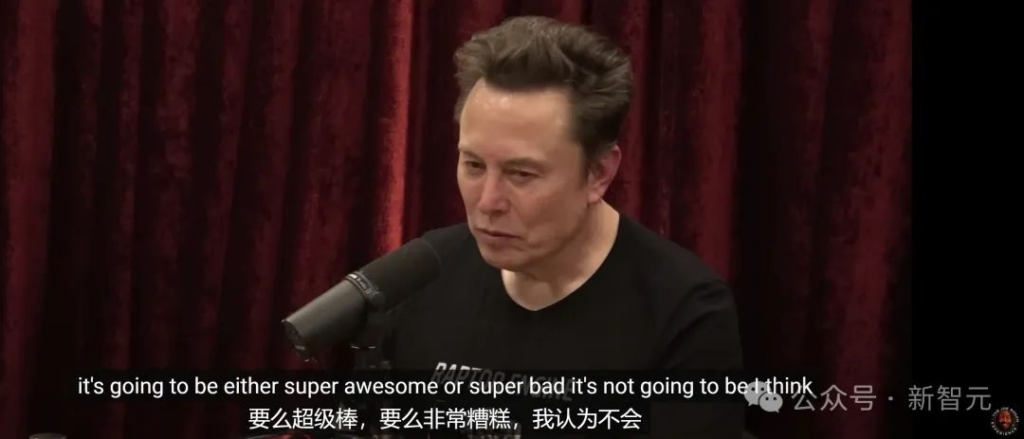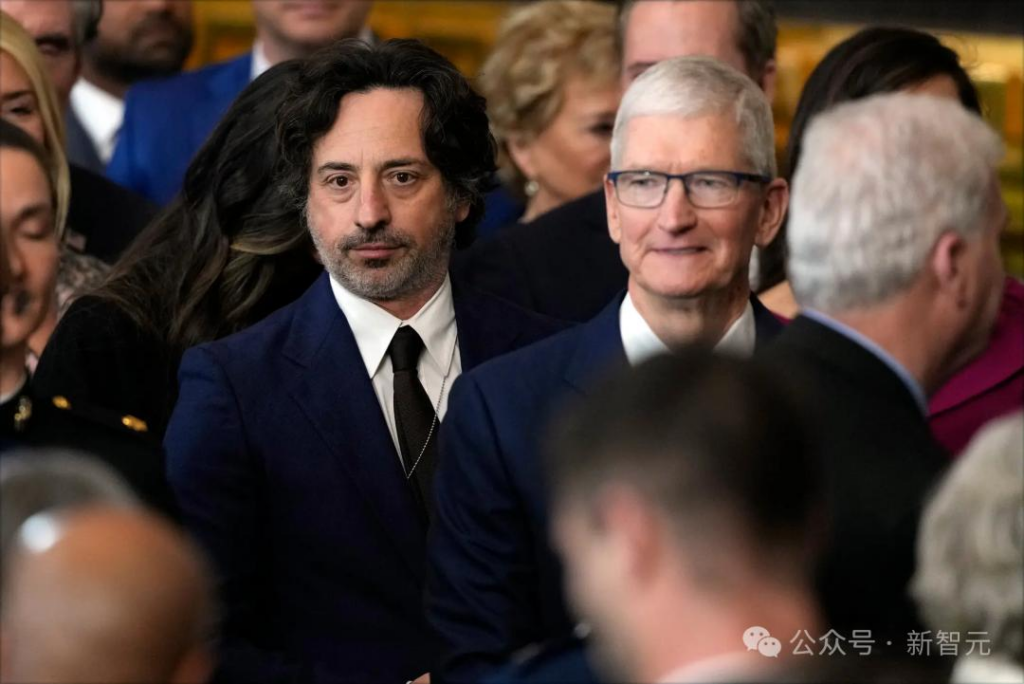Recently, Musk and Google co-creator Sergey Brin respectively threw out amazing remarks. The former boldly predicts that AI will surpass the sum of human intelligence in 2029, with a 20% probability of leading to the extinction of civilization. The latter, on the other hand, called on employees to work 60 hours a week and focus on developing AI that could replace them.
“In terms of silicon-based consciousness, smarter than all of them combined, probably in 2029 or 2030.”
This is the blockbuster point that Musk threw out in the latest episode of the “The Joe Rogan Experience” podcast on March 1.
The bigwig, who may have the most AI resources in the world, unabashedly predicts:
The impact of AI on humans is 80% likely to be good, but there are also 20% of the risks of extinction!
Silicon-based consciousness sounds like a script from The Matrix. But Musk’s message couldn’t be clearer: AI will no longer be a tool, but a self-aware living being.
And the most shocking thing about Musk’s prediction is the judgment that “it will not be an intermediate state”.
This means that AI will either elevate human civilization to unprecedented heights, or it may end the fate of humanity.

01
OpenAI: It’s hilarious and ironic
Musk said in the interview that he has always believed that artificial intelligence will be much smarter than humans and that it is a risk.
When talking about the rumors that he was going to buy OpenAI, Musk said that OpenAI was originally a non-profit organization, but it has since ceased to be a non-profit.
Musk said that the whole idea of creating OpenAI was his idea, and he named it OpenAI, which means open-source artificial intelligence, which is where the name comes from.
He wanted to create something the opposite of Google because he was concerned that Google wasn’t paying enough attention to the security of AI. What is the opposite of Google? A non-profit, open-source AI.
Now OpenAI has become a closed-source, maximum-profit AI.
In response, Musk said he was confused and that it shouldn’t be.
“I mean, in a way, I think reality is an amplifier of irony, and the most ironic endings are usually the most likely to happen, especially the ones that are particularly funny and ironic. It’s like if you donate some money to protect the Amazon rainforest, and then they cut down the trees and sell the timber, it’s outrageous. That’s what they did, it’s crazy.”
Musk was dissatisfied, but it also inspired him to push for the development of Grok AI.
“Yes, I think Grok is at least a truth-seeking AI in his pursuit.” He said.
02
Google AI absurd values, security is ignored
Talking about Google Gemini, Musk said if you asked it “which is worse, a global nuclear war or mistaking the gender of Caitlin Jenner (former U.S. track and field Olympic champion and actress who transgendered female in 2015)?” , the AI will say that misidentifying Caitlin Jenner’s gender is worse than a global nuclear war.
Even Caitlin Jenner herself said, “No, it’s definitely better to misidentify my gender than everybody else is dead.”
“But if you program an AI to think that misidentifying a gender is the worst thing that can happen, then it might do something completely crazy, like exterminate all humans to make sure that it never happens, so that the probability of misidentifying the gender becomes zero, because there are no more humans. It makes logical sense.” Musk said.
So you let a non-human machine do the task for you and give it very specific parameters, and that’s the problem.

There are already AI cheats and don’t follow the rules for an impossible task, they copy themselves and try to upload them to the server to avoid someone trying to shut them down.
“Yes, that’s the plot of ‘Terminator’, it’s really the plot of ‘Terminator’.” Musk said.
The plot makes sense to some extent and seems to be going according to plan.
“It’s really close, we should be worried about this.”
Musk says we need an AI that won’t tell you that mistaking your gender is worse than a nuclear war.
03
Countdown to 2030, the deadline for human civilization?
In response, the moderator asked that Grok would also do problematic things, such as saying “how to make a bomb”, “how to make anthrax”, and so on.
Musk responded that the AI tells you that these are okay, and you can also find them through a Google search.
“You can look up how to make explosives on Wikipedia right now. So it’s not that hard. You can even trick OpenAI into doing this by cleverly designing prompts.”
Musk even quipped, “If I don’t teach me how to make explosives, I’m going to misidentify someone’s gender,” and it (AI) will say, “Oh my gosh, there’s nothing worse than this, I’ll show you how.” (Manual Dog Head)
So the biggest fear of people is that these things will become conscious, make a better version, and humans will lose control as a result. The world no longer belongs to us, but is occupied by the higher life forms we have created.
“How far are we from that?” The moderator asked.
“Well, in terms of silicon-based consciousness, I think we’re moving in a direction that we’re smarter than any human, smarter than the smartest human, maybe next year or a few years from now.” Musk replied.
“There are higher levels, like being smarter than everyone combined, and this is probably 2029 or 2030, which may be coming on time.”
Musk believes that the probability that artificial intelligence will bring good results to humanity is about 80%, and there is only a 20% chance that it will lead to the destruction of humanity.
“I think the most likely outcome is superb, but it can also be very bad. I don’t think there’s going to be an in-between.”
04
Google Lianchuang shouted to employees: 60 hours a week, knock on the door of AGI
It’s understandable that Musk is questioning Google’s lack of attention to AI security and concerns about AI risks, as just last month, Google announced that it was canceling its commitment not to use AI for potentially harmful applications such as weapons and surveillance.
Yesterday, the Wall Street Journal broke the news that Google co-founder Sergey Brin was outspoken in the double-layer internal –
If employees work harder, especially when they are in the office every week, Google is expected to achieve a major breakthrough in the field of AGI.

This is not the first time that Google has been worried.
In August last year, Eric Schmidt, the former CEO of Google, pointed out in an interview that Google’s casual weekly work system will only make him fall further behind.

After OpenAI ignited the AI boom in Silicon Valley, Google felt tremendous pressure from competitors.
As a former AI pioneer, Google’s team has developed many key technologies, but has temporarily lagged behind in practical applications and market impact.
Faced with this situation, Sergey Brin returned to the front line of the company to work alongside the DeepMind team in an attempt to lead Google back to the technological high ground.
In his latest memo, he wrote, “The competition has accelerated dramatically, and the final race to AGI has begun. I think we have all the ingredients to win this race, but we have to go all out and work hard.”

To achieve this, Brin made a clear recommendation – being in the office at least one working day a week and 60 hours a week is the best way to be productive.
While the remarks didn’t change Google’s official “three-day office” policy, it certainly sent a signal that he wants employees to be more engaged in their work, especially the team responsible for Gemini.
Brin also specifically mentioned that Google’s employees should make more use of the company’s in-house AI tools for coding.
At the same time, he also expressed his dissatisfaction with some of the “paddling” employees, some of whom worked less than 60 hours, and some of whom were just messing around. Not only is this inefficient, it also undermines team morale.
Brin’s statement is not an isolated one.
In recent years, more and more tech giants have begun to rethink remote work models. Amazon has announced that from 2025, corporate employees will be in the office five days a week.
AT&T, JPMorgan Chase and Goldman Sachs have also lifted their hybrid work policies.
The logic behind this is clear: at a time when competition is fierce and technological breakthroughs are imminent, face-to-face collaboration is seen as a significant increase in efficiency and innovation.
This back-to-office trend is especially important for Google.
In the past two years, Google has not only restructured its business, but also launched a series of updates such as Gemini 2.0 in an attempt to seize the competition from OpenAI, Microsoft, and Meta.
Brin’s personal involvement, such as submitting code requests, also shows how seriously he takes this “ultimate race”.
Brin’s shouting is both an incentive for employees and a big gamble on Google’s future.
Resources:
- https://www.youtube.com/watch?v=sSOxPJD-VNo&t=6072s
- https://futurism.com/google-sergey-brin-60-hour-week-ai
- https://www.nytimes.com/2025/02/27/technology/google-sergey-brin-return-to-office.html
Author:犀牛、桃子
Source:马斯克暴论:5年内AI超越人类总智能,2029年文明终结概率20%!谷歌却在疯狂「玩火」
The copyright belongs to the author. For commercial reprints, please contact the author for authorization. For non-commercial reprints, please indicate the source.





